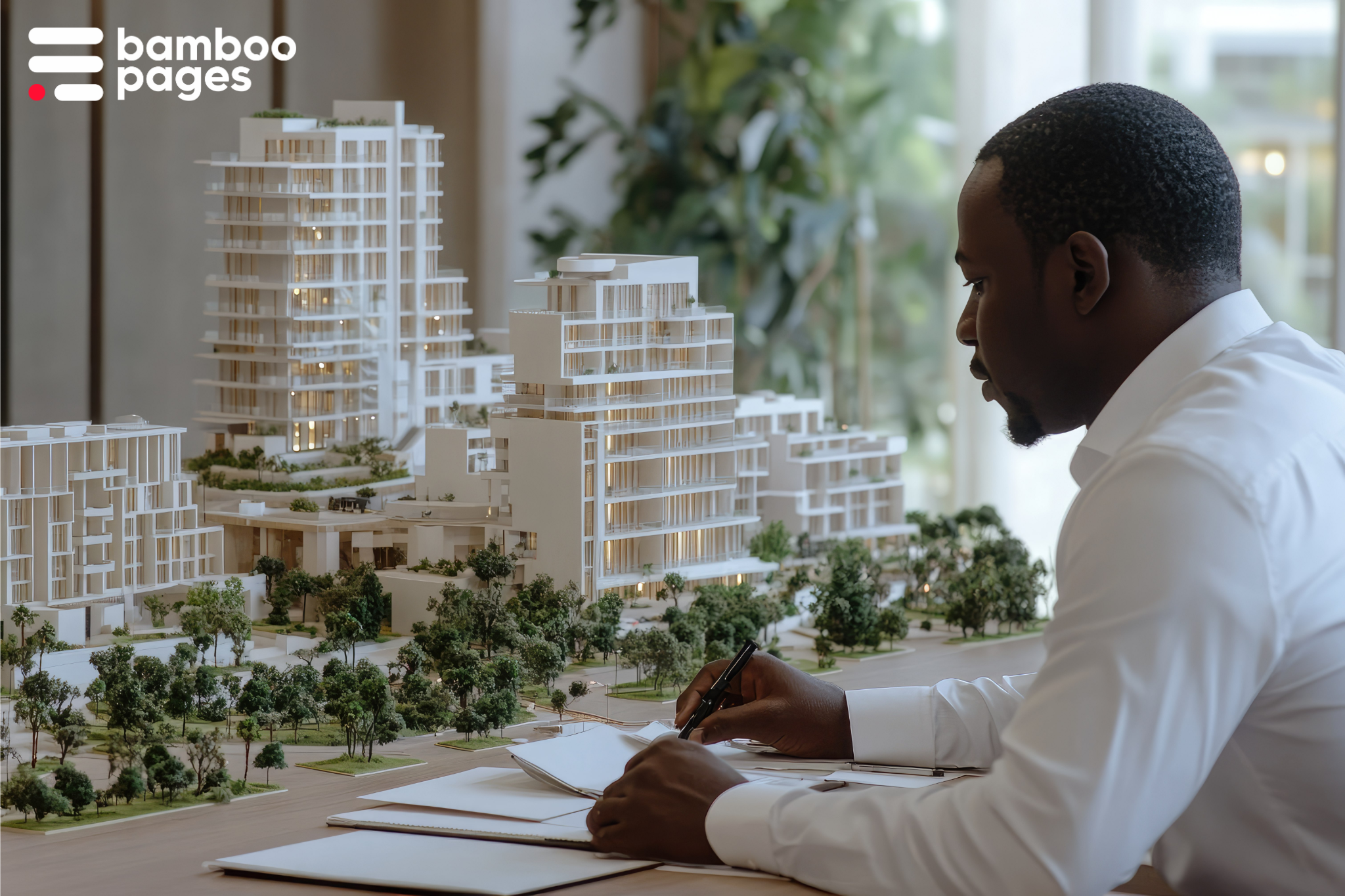Real Estate & Construction
Obirikwerre-Portharcourt Airport Road: The Billion-Dollar Corridor That Will Transform Real Estate Investment in Rivers State

There is something remarkable happening along the Obirikwerre-Airport Road in Port Harcourt, Rivers State, Nigeria. Once just another highway leading into Port Harcourt, it is now becoming one of the hottest real estate corridors in Nigeria. Developers, investors, and businesses are setting their sights on it, recognizing the enormous potential it holds. If you have been paying attention, you will know that this transformation is not random—it is the natural result of foresight, economic shifts, and the inevitable expansion of a growing city.
I have been talking about the future of this corridor since 2018, long before the current wave of development started. Even then, it was clear to me that this stretch of real estate would one day become the most sought-after and valuable land in Rivers State. Today, that vision is beginning to take shape. Major developments are springing up, land prices are climbing, and in the coming years, this area will become an investor’s paradise.
But the real question is not whether this area will develop—it is how well it will be managed and who will have the vision to invest before the boom reaches its peak. The best real estate investors are those who can see the future before others do. They recognize where demand is heading, where infrastructure is improving, and where government and private capital are flowing. Those who act now will position themselves for unimaginable returns in the years ahead.
A Future Skyline of Skyscrapers and Global Brands
Imagine stepping off a plane at the Port Harcourt International Airport and being greeted by a breathtaking skyline—a corridor lined with glass-clad skyscrapers, five-star hotels, luxury condos, and bustling commercial districts. International corporations have set up their regional headquarters here. High-end restaurants, shopping malls, and entertainment centers cater to a cosmopolitan crowd. Wide, beautifully paved roads, adorned with modern street lighting and green spaces, lead into the heart of the city.
This is the future of the Obirikwerre-Portharcourt Airport Road. It is not just about building more structures—it is about creating a city within a city, a place that symbolizes progress, ambition, and economic prosperity. With the right vision, this corridor can rival the likes of Dubai’s Sheikh Zayed Road or Lagos’ Eko Atlantic.
Already, the groundwork for this transformation is being laid. The TAF City Project, spearheaded by TAF Africa Global Limited, is bringing world-class urban planning to the area, offering smart residential and commercial spaces designed for modern living. The NAF City, a government-backed development, is further driving interest in the region. International construction firms, particularly from China, are setting up shop, knowing that what happens here in the next decade will define the real estate market in Rivers State for generations.
And then there is the projected bamboo Center, a five-star commercial and lifestyle hub that will include luxury hotels, premium office spaces for global brands, event centers, and high-end mixed-use residential developments. This will be the heartbeat of the new Obirikwerre-Airport corridor—a place where business, leisure, and luxury converge.
A Golden Opportunity for Investors in Port Harcourt's Fastest-Growing Corridor
Now is the perfect time for investors to enter Port Harcourt’s booming real estate market. Land prices in the Obirikwerre-Airport Road corridor are still in their early growth phase, but this will not last long. With rapid development underway, projections indicate that returns on investment (ROI) could rise as high as 100% annually for several years. This is a rare window of opportunity that forward-thinking entrepreneurs and real estate moguls must seize before the market matures.
What makes this corridor so valuable? Its strategic location, exceptional accessibility, and massive economic growth potential set it apart. As the main gateway into Port Harcourt, it offers the city's first impression to visitors and must reflect progress and prosperity. Its proximity to the airport, major road networks, and potential for future transport infrastructure improvements make it a prime area for development. With industries expanding and businesses looking for modern office spaces, hotels, and commercial centers, demand for real estate in this region is set to skyrocket.
While private investors will drive much of the transformation, the government must take a proactive role in ensuring sustainable growth. A well-planned urban framework is essential to prevent disorderly development. Strict zoning laws should define commercial, residential, industrial, and entertainment districts, while investments in infrastructure such as roads, drainage systems, reliable power, and water supply must support this growth. Policies that offer tax incentives and attract multinational corporations, hotel chains, and tech startups will further accelerate economic expansion. Additionally, ensuring security and investor protection will create a stable business environment, fostering long-term confidence in the market.
If these measures are implemented effectively, the Obirikwerre-Airport Road corridor will not only attract billions in foreign direct investment (FDI) but also create thousands of jobs, boost tourism, and significantly increase government revenue. The future of Port Harcourt’s real estate market is unfolding, and those who act now stand to gain the most.
A Vision Worth Pursuing
The Obirikwerre-Airport corridor is not just another part of Port Harcourt—it is the future of the city’s real estate market. The signs are clear: this area is on a trajectory to become the most valuable and prestigious stretch of land in Rivers State.
What is happening now is just the beginning. In five to ten years, the transformation will be undeniable. Those who take action now—who secure prime real estate and participate in its development—will be the ones who reap the biggest rewards.
This is not speculation. This is a calculated projection based on real estate trends, economic indicators, and the natural evolution of urban expansion. The only question left is who will be bold enough to invest before the world catches on?
For Rivers State, this is a once-in-a-lifetime opportunity to create something extraordinary. For investors, this is the chance to be part of the next great real estate success story. And for those who hesitate, the only certainty is regret.
The future of Port Harcourt is rising along the Obirikwerre-Airport Road. The time to build, invest, and dream big is now.

Real Estate & Construction
Dear Realtor, Stop Chasing Commission, Start Building Legacy.

In today’s fast-moving property market, many realtors are in a rush. But it’s not always to serve the client better, it’s often to close the deal, get the commission, and move on to the next client. It’s a silent truth in the industry: many buyers are being sold to, not truly served.
You walk in hopeful, trusting the professional/realtor in front of you. They speak confidently, show you options, push you to "act fast." Before you know it, you're signing papers for a property that might not even be right for you, because someone else wanted their commission sooner.
But here’s what real estate should be: a process rooted in trust, not pressure. A decision guided by insight, not incentives. A relationship built on service, not sales.
I believe that your home is a foundation for your life. It's not just about location and square footage, it's about your future, your peace of mind, and your financial health.
That’s why I advice realtors to take a different approach. Ask the questions most don’t—about your client’s future, family, career, and lifestyle goals. Discourage rushed decisions, even if it delays your commission.
Take the time to educate your prospective clients on risks, legalities, and long-term implications. And when you say you care, mean it. Our job as realtors isn’t just to sell a property. It’s to help our clients make one of the most important decisions of their lives, with clarity, confidence, and peace.
As a client, before you sign anything, ask yourself: “Am I being served, or sold to?” If it’s the latter, walk away.
The real estate industry is ripe for a reset. For too long, many realtors have treated the profession as a quick game, rushing to close deals, collect commissions, and move on. The goal is often to complete the transaction as fast as possible, regardless of whether the deal is in the long-term best interest of the client.
But real estate is not just about transactions. It’s about transformation. It’s not about selling, it’s about serving. And if realtors want to remain relevant and valuable in today’s evolving market, they must start thinking bigger, beyond the sale.
Let’s be honest. In many markets, especially in emerging economies, real estate agents are seen as middlemen, useful in the moment, forgettable after the deal. Why? Because that’s how many have positioned themselves.
Once the client closes on a property, the relationship ends. No follow-up. No post-sale value. No strategic advice. Just a handshake, and maybe a referral request. This short-term mindset is not only limiting, it’s leaving money, trust, and legacy on the table.
There’s a smarter way to work in real estate. A model where realtors evolve into long-term partners in their clients’ real estate journey. We call it Legacy Realty.
This model isn’t about chasing commissions, it’s about becoming a real estate advisor and property consultant. A trusted professional your clients can turn to for every real estate decision for years to come.
Imagine this: instead of disappearing after a sale, you help your client manage their new property, connect them with reliable tenants, and provide advice on generating rental income or short-let opportunities.
You offer tips on how to develop fallow land into income-generating assets, whether through lease, JV development, or agricultural partnerships (I will write extensively on this in another article – watch out). You guide them on construction decisions, recommend trusted contractors (not the guy who disappears with cement money), share insights on cost-saving materials, and help supervise ongoing projects.
You help them understand how to legally protect their assets, access government housing incentives, or even structure estate planning for intergenerational wealth transfer.
When they need to sell, rent, build, or buy again, you’re the first call. Not because you’re a sales agent, but because you’re their real estate strategist. Their partner. Their plug.
The truth is, people don’t just want to buy property, they want to build wealth. They don’t just want land, they want to know what to do with it. They don’t just want a house, they want a future. And the professional who helps them unlock those outcomes isn’t a salesperson. It’s a partner.
This is the new role of the realtor. One who advises, manages, supports, and grows with their clients. A person who doesn’t see themselves as a "land seller" but as a guide on the journey to property prosperity.
I believe real estate is not just a market, it’s a mission. We don’t just facilitate deals; we nurture destinies. We work with our clients to help them see the big picture, whether it’s turning a plot of land into passive income, restructuring a portfolio for maximum ROI, or connecting them with the right professionals to build right and build smart.
Realtors aren’t just closers. They’re curators of wealth. They’re managers of opportunity. They’re builders of legacy.
Because commission pays you once. Legacy pays you for life.
When you build trust, offer ongoing service, and grow with your client, you stop chasing leads and start receiving referrals. Your brand grows through word-of-mouth. Your income becomes stable, recurring, and expansive. You stop being “the guy who sold me a house” and become “our family’s real estate person.” That’s real impact. That’s legacy.
As the real estate landscape grows more competitive and clients become more informed, trust will become the most valuable currency. The realtors who will thrive aren’t those who sell fast—they’re those who stay long. They’ll be the ones who grow with their clients. Who stay in the room even after the deal is done. Who offer solutions, not just listings.
The future belongs to the Legacy Realtors—those who see real estate not as a job, but as a calling.
If you’re ready to shift from selling to serving, from commission to connection, from agent to advisor, join us by reaching out to me.
We’re building Africa’s future—one relationship at a time.
The author Oséyómón Ighodaloh is an entrepreneur and CEO of bamboo group, dedicated to Africa’s development through innovation and business development. He writes from Abuja, Nigeria. Oseyomonighodaloh@gmail.com
Real Estate & Construction
The Urban Planning Crisis in Nigeria: A Call for Government Action and Civic Engagement

Nigeria’s rapid urban expansion, particularly in cities like Port Harcourt, has exposed a glaring failure in urban and regional planning. The absence of a functional planning framework has led to unchecked real estate development, unstructured housing clusters, and the loss of designated zones for industry, education, entertainment, and agriculture. As real estate developers take advantage of these gaps, the result is a chaotic urban landscape that lacks the basic infrastructure necessary for sustainable living.
The Case of Port Harcourt: A City Losing Structure
Port Harcourt, once known for its well-organized township design, is now a case study in poor urban planning. From the University of Science and Technology (UST) axis down to Igwuruta, new developments are springing up without clear zoning policies or infrastructure support. In Ikwerre and Etche Local Government Areas, an influx of real estate investors is further compounding the issue, transforming these zones into disorganized settlements with no long-term sustainability plan.
This trend is a direct consequence of weak or non-existent oversight from the Ministry of Urban and Regional Planning. The agency tasked with ensuring structured development appears either inactive or overwhelmed, leaving private developers to shape the urban landscape based solely on profit motives. Without proper planning, these areas are headed for a future of congestion, inadequate drainage systems, and poor access to basic amenities.
The Key Elements of a Functional Urban Planning System
A well-planned city is structured to balance growth with sustainability, ensuring livability for its residents. Zoning laws play a crucial role by designating specific areas for housing, industry, agriculture, entertainment, and public services, preventing the chaotic mix of developments seen in poorly planned cities.
Equally important is pedestrian-friendly infrastructure, including sidewalks, bicycle lanes, and safe crossings that enhance mobility and reduce dependence on cars. Green spaces such as parks, gardens, and tree-lined streets are essential for improving air quality, regulating temperature, and offering recreational areas.
To prevent unchecked expansion, "no-development" zones must be enforced to protect natural reserves and curb reckless deforestation. Proper road networks and drainage systems ensure organized traffic flow and prevent flooding, while public transportation hubs with well-planned bus terminals and rail connections help ease congestion.
When these elements are effectively implemented, cities become more efficient, sustainable, and livable, fostering economic growth without compromising environmental stability.
The Consequences of a City Without Planning
A city without proper urban planning is destined for chaos. In Nigeria’s rapidly expanding urban centers like Port Harcourt, unchecked development has led to flooding, traffic congestion, and failing infrastructure. Buildings are constructed without proper access roads, drainage systems, or essential utilities, making entire neighborhoods unlivable.
The loss of green spaces is another major issue. Parks, gardens, and tree-lined streets are disappearing, leaving cities hotter, more polluted, and visually unappealing. Public infrastructure, including sidewalks and pedestrian crossings, is either inadequate or nonexistent, making cities hostile for both residents and businesses.
Worse still, unregulated real estate development fuels slum expansion. Informal settlements lacking basic amenities emerge as profit-driven construction replaces thoughtful zoning. The environmental impact is severe—deforestation, soil erosion, and water pollution worsen flooding and climate conditions.
Without urgent government intervention and public pressure, Nigerian cities risk descending into irreversible disorder. Sustainable planning, strict zoning laws, and better infrastructure development are no longer optional—they are a necessity.
Enforcing Urban Planning: The Role of Government and Civic Action
Nigeria’s urban chaos is a direct result of weak enforcement of planning laws. To restore order, the government must strengthen the Ministry of Urban and Regional Planning, equipping it with the resources and authority to enforce zoning regulations. Implementing and strictly adhering to master plans for cities is crucial, ensuring that development follows a structured path. Public-private partnerships (PPPs) must also be enforced, requiring real estate developers to align with city plans and contribute to infrastructure. Additionally, construction projects should undergo rigorous approval processes to prevent environmental and structural violations.
However, government action alone is not enough. Civic groups and the public must demand accountability through advocacy, media campaigns, and legal action against irregular developments. Community involvement in decision-making through town halls and consultations is essential, while citizens must actively monitor and report non-compliant projects. Without immediate intervention from both the government and civic bodies, Nigeria’s cities will continue their descent into disorder. The time to act is now.
The Future: Planned Cities or Unlivable Spaces?
The choice is clear—either Nigeria takes urban planning seriously or faces a future where its cities become unlivable. The government must reclaim its role in regulating urban expansion, and citizens must actively demand better planning policies. If action is not taken now, the next generation will inherit a landscape defined by congestion, flooding, and disorder—problems that could have been prevented with proper planning today.
Port Harcourt and other rapidly growing cities still have a chance to change course. The question is, will the government and the people rise to the challenge?
-
Op-Eds3 months ago
AFRICA’S SECRET WEAPON FOR THE NEW WORLD ECONOMIC ORDER – PART 1
-
Diaspora & African Development3 months ago
Harnessing diaspora potential for Africa’s transformation
-
Real Estate & Construction2 months ago
Dear Realtor, Stop Chasing Commission, Start Building Legacy.
-
Real Estate & Construction3 months ago
The Urban Planning Crisis in Nigeria: A Call for Government Action and Civic Engagement
-

 bamboo update2 months ago
bamboo update2 months agoBAGSHAWS ESTATE, BAMBOO REAL ESTATE LATEST OFFERING HITS THE NIGERIAN REAL ESTATE MARKET